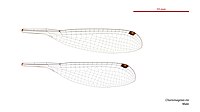Chorismagrion
Appearance
| Pretty relict | |
|---|---|

| |
| Adult nymph of Chorismagrion risi | |
| Scientific classification | |
| Domain: | Eukaryota |
| Kingdom: | Animalia |
| Phylum: | Arthropoda |
| Class: | Insecta |
| Order: | Odonata |
| Suborder: | Zygoptera |
| Family: | Synlestidae |
| Genus: | Chorismagrion Morton, 1914[2] |
| Species: | C. risi
|
| Binomial name | |
| Chorismagrion risi | |

| |
Chorismagrion is a monotypic genus of damselflies belonging to the family Synlestidae.[3] The single species of this genus, Chorismagrion risi,[4] known as a pretty relict,[5] is a slender, medium-sized damselfly, mostly black in colour with white markings.[6] It is endemic to north-eastern Australia, where it inhabits streams and large pools in rainforests.[7]
See also
Notes
Until recently, Chorismagrion was considered to be the only genus in the family Chorismagrionidae.[5]
Gallery
-
Female Chorismagrion risi wings
-
Male Chorismagrion risi wings
References
Wikimedia Commons has media related to Chorismagrion risi.
Wikispecies has information related to Chorismagrion.
- ^ Dow, R.A. (2017). "Chorismagrion risi". IUCN Red List of Threatened Species. 2017: e.T87536627A87540114. doi:10.2305/IUCN.UK.2017-1.RLTS.T87536627A87540114.en.
- ^ a b Morton, K.J. (1914). "A remarkable new genus and new species of Odonata, of the legion Podagrion, Selys, from north Queensland". Transactions of the Entomological Society of London. 62: 169–172 [170] – via Biodiversity Heritage Library.
- ^ "Genus Chorismagrion Morton, 1914". Australian Faunal Directory. Australian Biological Resources Study. 2012. Retrieved 3 April 2017.
- ^ "Species Chorismagrion risi Morton, 1914". Australian Faunal Directory. Australian Biological Resources Study. 2012. Retrieved 3 April 2017.
- ^ a b Theischinger, Günther; Hawking, John (2006). The Complete Field Guide to Dragonflies of Australia. Collingwood, Victoria, Australia: CSIRO Publishing. p. 22. ISBN 978 0 64309 073 6.
- ^ Watson, J.A.L.; Theischinger, G.; Abbey, H.M. (1991). The Australian Dragonflies: A Guide to the Identification, Distributions and Habitats of Australian Odonata. Melbourne: CSIRO. ISBN 0643051368.
- ^ Theischinger, Gunther; Endersby, Ian (2009). Identification Guide to the Australian Odonata (PDF). Department of Environment, Climate Change and Water NSW. p. 208. ISBN 978 1 74232 475 3.



